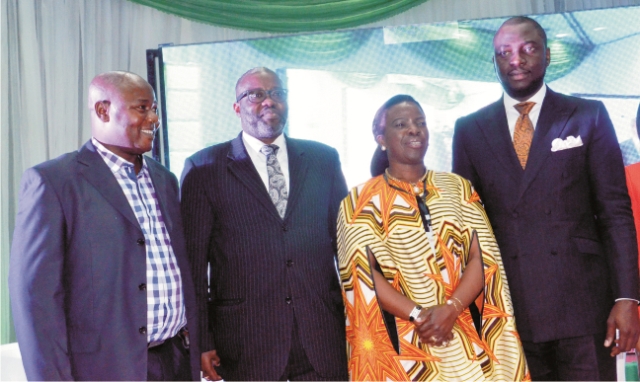Business
VC Charts Path To Solid Minerals Dev

The Vice-Chancellor,
Ahmadu BelIo University, Zaria, Prof. Ibrahim Garba, says Nigeria needs the right attitude and knowledge to develop its solid minerals sector.
Garba, who is also the Chairman, Committee on Solid Minerals Development Roadmap, disclosed this in Abuja.
“There must be correct altitude and knowledge to know what you have and how to exploit it for the benefit of the country.
“There was nothing new in the solid minerals roadmap, but certainly the solid minerals (sector) is the one least understood by everybody – public, government and even by government officials themselves.
“It is a sector that is not known to Nigeria even though Nigeria had very glorious mining in the past which died since 1970s.
“And that is why the modern Nigeria has not come to know mining as a business, as a means of sustaining the nation’s economy, other than mining of petroleum which is also mining.”
Garba said for this reason, Nigeria had continued to struggle with the understanding of what it would take to develop the solid minerals sector.
He said that even though in the last 10 years, the Federal Government had been striving to reform the sector, unfortunately the sector had yet to occupy the right place in the development of the country’s economy.
He said the solid minerals sector remained largely undeveloped because of ignorance and poor attitude toward the sector.
Garba underscored the need for adopting the right approach for the sector, which was basically knowledge-based and knowledge-driven, to attract investors.
“We must have the correct altitude because it is a business sector where you need to attract investments and investment funds from potential investors,” he said.
The vice-chancellor said that the knowledge aspect of mining cut across scientific knowledge of knowing the minerals, knowing where they were, how they were formed and how to find them.
He said that government must also have knowledge of how to provide an environment that was conductive to investments and how to nurture the sector as means of development.
Garba said that mining was a potent means of revenue generation, adding that revenue generated must, however, be used for more sustainable development since mining was not renewable like agriculture.
“Mining is very destructive to the environment. It is based on finite resources means that the amount of resources you find will one day finish; it is not renewable.
“Due to these constraints and challenges around the sector, government upon government failed to understand probably what it takes to develop the sector. And whenever our leaders understand it, they failed to take the correct steps to make it work.
“In the last 10 years, the roadmap has been there but we miss it 10 years ago and we have to go back 10 years and recover the roadmap and follow it,” he said.
Garba said that 10 years ago, all the necessary instruments of reform, in terms of the legal framework, institutional framework and technical ingredients to push the sector forward, were put in place but were not followed.
He said Mining Act was enacted in 2007 and the institutional reforms were put in place in 2006, adding, however, that successive governments failed to develop the solid minerals sector up to the recommended level.
He emphasised that mining was a competitive sector and that Nigeria’s neighbours were doing well in the sector.
“Petroleum resources have spoiled everything in Nigeria. As long as petroleum dollars flow into this country without any efforts of our own, it will kill all morale and means of hard work.
“And this sector is not like petroleum, even though there are all minerals. It requires much hard work to get it going,” he said.
Garba recalled that 10 years ago, the solid minerals could have been well developed, with local and international input, adding that nowadays, its development required a different approach.
He said that in the course of the work on the roadmap, all the existing instruments were re-assembled and put in context in relation to the current realities in Nigeria.
“We needed this more today than 10 years back because our challenges today are worse than our challenges 10 years back,” he said.
He urged government to take deliberate steps aimed at promoting the development of the sector so that Nigeria would not miss the mark as it did 10 years ago.
Garba recalled during colonial era, all the mining activities in Nigeria were carried out 100 per cent by private sector companies.
He advised government to encourage private companies invest in the mining sector.
Business
NCDMB, Partners Sweetcrude On Inaugural Nigerian Content Awards

The Nigerian Content Development and Monitoring Board (NCDMB), in partnership with a firm, Sweetcrude Ltd., has announced detailed selection criteria for the inaugural “Champions of Nigerian Content Awards”, designed to honor outstanding contributions to local content development in Nigeria’s oil and gas sector.
The Tide learnt that the event, scheduled to hold 21st May, 2025, at the NCDMB’S content tower headquarters in Yenagoa, capital of Bayelsa State, will recognize individuals and organizations that have demonstrated exceptional commitment to advancing Nigerian Content in 2024.
The Tide further gathered that the ceremony will coincide with the Nigerian Oil and Gas Opportunity Fair (NOGOF), which promises to spotlighting industry excellence and contributions to national economic transformation.
A statement by the Board’s Directorate of Corporate Communications and Zonal Coordination says the event has 12 Award Categories, which include, “Nigerian Content Icon of the Year”, “Nigerian Content Lifetime Achievement Award”, “Nigerian Content International Upstream Operator of the year”, and the “Nigerian Content Independent Upstream Operator of the year”.
Others are, “Nigerian Content Midstream Operator of the year”, “Nigerian Content Downstream Operator of the year”, “Nigerian Content International Service Company of the year”, Nigerian Content Indigenous Service Company of the year”, and the “Nigerian Content Innovator of the year”.
Also included are, “Nigerian Content Financial Services Provider of the year”, “Nigerian Content Media Organization of the year”, and “Women in Leadership Award for Promoting Gender Equality and Empowerment”.
According to the NCDMB, the criteria for oil and gas operators will include key and empirical benchmarks such as Production output for crude oil and gas volumes, Compliance with Nigerian Content Plans (NCPs) and Nigerian Content Compliance Certificates (NCCCs).
Other criteria are adherence to NOGICD Act reporting requirements, such as submission of Nigerian Content Performance Reports and Employment & Training Plans.
The Board’s statement added that similar criteria will apply to financial institutions, media organizations, and individuals, ensuring a transparent and merit-based selection process.
“Winners for the Nigerian Content Icon of the Year, Innovator of the Year, and Women in Leadership Award will also be selected based on measurable performance indicators.
“The Advisory Committee of Industry Titans will Oversee the process to uphold the prestige of awards. The Committee consist of distinguished experts set up to oversee nominations and validate winners”, the NCDMB said.
Members of the committee, according to the Board, include: Pioneer Executive Secretary of the NCDMB, Dr. Ernest Nwapa; Secretary-General, African Petroleum Producers Organization, Dr. Omar Farouk; and former Zonal Operations Controller, DPR, Mr. Woke Akinyosoye.
The Statement quoted the Executive Secretary, NCDMB, Engr. Felix Omatsola Ogbe, as emphasizing that the awards aim to becoming the oil and gas sector’s equivalent of the Oscars, celebrating genuine impact rather than mere participation.
“This recognition is reserved for those who have gone beyond compliance to drive tangible growth in Nigerian Content.
“With a focus on credibility, compliance, and measurable impact, the Champions of Nigerian Content Awards is poised to set a new standard for excellence in Nigeria’s energy sector”, the NCDMB Executive Scribe said.
By: Ariwera Ibibo-Howells, Yenagoa
Business
Nigeria’s Debt Servicing Gulped N696bn In Jan – CBN

Nigeria’s apex Banking institution, Central Bank of Nigeria (CBN), has declared that Federal Government’s debt servicing increased to N696billion in January 2025.
The CBN’s recently published Economic Report revealed a precarious fiscal position, which worsened in January 2025 as debt servicing obligations exceeded total retained revenue by a wide margin.
According to the report, the Federal Government’s debt servicing obligations for the month stood at N696.27bn, while total retained revenue amounted to only N483.47bn, indicating that debt service alone consumed about 144 per cent of all government earnings.
This development highlights the growing debt burden and dwindling fiscal space facing Africa’s largest economy.
According to the report, despite slight improvements in some revenue categories, the retained earnings were grossly inadequate to cover obligatory debt repayments, exposing the government’s continued reliance on borrowing to meet basic obligations.
The report further revealed that retained revenue in January 2025 only recorded a marginal 0.89 per cent increase when compared with the N479.21bn generated in the corresponding month of 2024.
”FGN retained revenue declined in the review period, owing largely to lower receipts from Federal Government Independent Revenue and FGN’s share of exchange gain.
“At N0.48tn, provisional FGN retained revenue was 69.19 and 70.40 per cent below the levels recorded in the preceding period and monthly target, respectively”, it revealed.
While this points to stagnation rather than growth, the marginal rise was wiped out by the overwhelming debt service obligations.
The retained revenue components showed that the Federation Account contributed N167.69bn, while the VAT Pool Account delivered N90.73bn.
By: Corlins Walter
Business
Wage Award: FG Plans 5 Months Arrears Payment

The Federal Government has announced plans to commence the payment of the outstanding N35,000 wage award arrears owed workers in the Federal Civil Service.
A statement issued by the Office of the Accountant-General of the Federation (AGF), which was signed by the Director of Press and Public Relations, Bawa Mokwa, said the outstanding arrears will be paid in instalments, with workers set to receive N35,000 per month for five months.
It clarified that the first tranche of the wage award arrears would be released immediately after the April salary payment.
“The wage award arrears was not paid with the April 2025 salary; it will come immediately after the salary is paid”, the statement read.
The Federal Government had earlier disbursed wage awards to federal workers for five months as part of efforts to cushion the impact of economic reforms. However, five months’ arrears remained unpaid.
The AGF office further reiterated the government’s commitment to fully implementing all policies and agreements relating to staff remuneration and welfare, noting that such efforts were geared towards enhancing productivity and operational efficiency across ministries, departments, and agencies.
The N35,000 wage award was introduced in 2023 as a palliative measure to support workers following the removal of the petrol subsidy and other economic adjustments.
In January this year, the Federal Government assured workers that it would clear the arrears of the N35,000 wage award, just as it also said the government had resumed the payment of the wage award.
The government also reiterated its commitment to addressing issues in the National Minimum Wage agreement reached with the Organised Labour in 2023.
The Minister of Labour and Employment, Nkeiruka Onyejeocha, had disclosed the government’s commitment towards implementing agreements with trade unions during separate meetings with the leadership of the Trade Union Congress and Congress of University Academics, in Abuja.
The Nigeria Labour Congress had criticised the Federal Government over the delay in the payment of the minimum wage for certain workers in the federal civil service.
Also, the Federal Government had earlier blamed the delay in payment on the prolonged approval of the 2025 budget.
By: Corlins Walter
-

 Sports4 days ago
Sports4 days agoBundesliga: Kane Scores, Celebrates First Ever Title
-

 Business4 days ago
Business4 days agoWage Award: FG Plans 5 Months Arrears Payment
-

 News4 days ago
News4 days agoArmy Detains Soldier Over Alleged Assault In Benue
-

 Rivers4 days ago
Rivers4 days agoOpobo/Nkoro SOLAD Pledges To Prioritise Workers’ Welfare
-

 News4 days ago
News4 days agoSERAP Gives CBN Seven Days Ultimatum To Disclose Allocation Disbursements To 774 LGAs
-

 Editorial4 days ago
Editorial4 days agoEnd The Senseless Killings
-

 Sports4 days ago
Sports4 days agoTeam Sleeps At Facility After Attack
-

 Business4 days ago
Business4 days agoNigeria’s Debt Servicing Gulped N696bn In Jan – CBN

